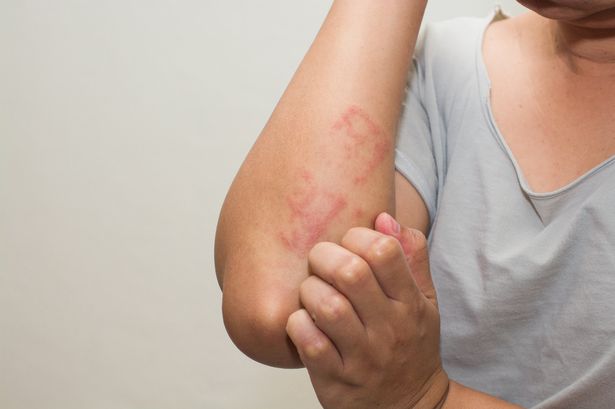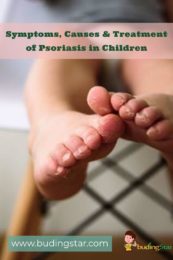Psoriasis is a chronic inflammatory skin disease, with plaque psoriasis being the most common type in both children and adults. This condition causes the skin cells to grow rapidly and not shed off as they should. Instead, the cells pile up on the skin surface, causing thick whitish scales and plaques. An overactive immune system mostly causes this process. Plaque psoriasis may appear on any part of the body, but it is most common on the scalp, knees, torso, and elbows. This post talks about how parents can manage psoriasis in children.
Symptoms of Psoriasis in Children:
The signs and symptoms vary from person to person and depend on the type of psoriasis. However, the common symptoms of psoriasis include:
- Inflamed skin, red patches or rashes often covered with thick silvery-white scales (often mistaken for nappy rash in young children)
- Discoloured, thickened, or pitted toenails and fingernails. The nails may also detach or crumble from the nail bed.
- Stiff, achy, and swollen joints
- Dry, cracked skin that may itch or bleed
- Itchiness, soreness, and burning sensation in and around the affected skin areas
Psoriasis is a common, chronic disease with no cure, and this condition may never disappear entirely. It is also an illness that cycles through periods, flares for weeks or months and, then subsides or even goes into remission. During active times, the child will have more symptoms. The timing of these cycles is often unpredictable, and once the process begins, it is difficult to tell the severity of the symptoms.
Causes of Psoriasis:
Although scientists don’t exactly know what causes psoriasis, genetics and the immune system are the most common causative agents. Psoriasis genetics are complex, and one can develop it without having any family history of the disease. Most doctors believe that the inherited gene must be triggered by external factors like allergy, stress, or infection for psoriasis symptoms to manifest.
Viral and group A streptococcal infections are the most common childhood infections closely linked to psoriasis in children. When symptoms develop, any triggers can cause a psoriasis flare. The common triggers include:
Stress
This is one of the most common triggers for psoriasis. Problems with home life, friends, or schools may result in symptoms, even if the stress is invisible.
Skin Injury
Psoriasis flare can appear in harmed or injured skin areas. Minor scratches, bug bites, vaccinations, and sunburns can also trigger psoriasis.
Allergies
Allergies to pollen, pet dander, food, detergents, and other common allergens can cause psoriasis flare-ups.
Weather
Cold, dry weather may cause psoriasis in some kids due to the lower humidity and lack of sunlight. Warm and moist weather often improves symptoms.
Now we will discuss how parents can manage psoriasis in children.
How Parents Can Manage Psoriasis in Children
Psoriasis affects children differently and has to be addressed differently on every child. This disease may have a significant effect on the child’s quality of mood and life. Parents with children dealing with this disease should help them to feel emotionally relaxed and physically comfortable. Talk and teach them about psoriasis and its triggers and how they can avoid them. Explain to them the importance of psoriasis treatment, taking medicine, and applying moisturizers on their skin.
Work with your child’s doctor to tackle the psychological and negative emotional impact caused by this condition. Choose loose-fitting clothes, hats, and shoes for your child, especially during summer seasons – tight clothes can injure and worsen the inflamed skin. Encourage your kid to take time for fun, social, or personal stress-relieving activities.
Help your child avoid picking at and scratching the affected area. Keep the kid’s nails clean and short to prevent skin infections. Also, watch your child’s sun exposure to avoid sunburns and humid or hot conditions that can intensify skin irritations and itching.
Give your child the prescribed medications to treat psoriasis as directed by the pharmacist or doctor. Depending on the severity of your child’s symptoms, the medicines used for psoriasis treatment can be creams and ointments, or capsules. So, these are the tips on how parents can manage psoriasis in children.
- Baby Monitors with Noise Monitoring: How They Work and Why They Matter - October 2, 2025
- Attachment Parenting Guide: Principles, Practices, and What to Expect - September 9, 2025
- Understanding Your Baby’s Cry: A Parent’s Mini Guide - June 23, 2025
- Bottle vs. Breastfeeding: What Works for You and Your Baby - June 18, 2025
- 10 Yoga Poses For Kids at Home: Benefits Of Yoga For Kids - June 12, 2025
- Parenting Guide to Child Development: Key Milestones from Birth to 10 Years - June 4, 2025
- Summer Vacation Plans Ideas with Kids - May 27, 2025
- Nutritious Dried Fruit Treats for Toddlers (16–24 Months) - May 25, 2025
- Importance of Screen Time Management for Kids - May 24, 2025
- The 6 Most Common Pregnancy Concerns First-Time Moms Have - May 23, 2025














